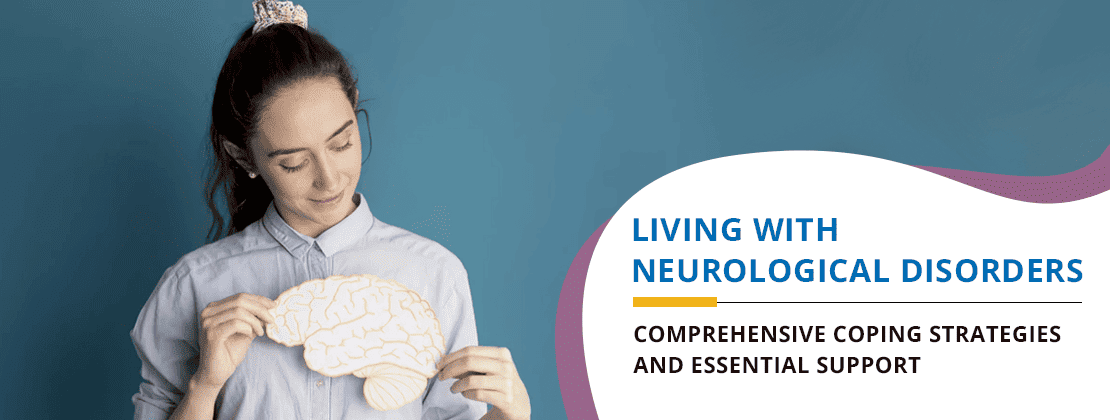
Home / Blog / Living with Neurological Disorders: Comprehensive Coping Strategies and Essential Support
Living with a neurological disorder can significantly impact an individual’s life. Disorders such as Parkinson’s disease, epilepsy, Alzheimer’s disease, or stroke can alter physical capabilities, disrupt cognitive functioning, and affect emotional well-being. These conditions pose daily challenges, sometimes turning routine tasks into uphill struggles. This article provides a detailed insight into managing neurological disorders and highlights the invaluable role of support systems and effective coping strategies in navigating the journey of life with a neurological condition.
Table of Contents
Neurological disorders result from abnormalities in the brain, spinal cord, or nerves that can cause a wide range of symptoms, including movement problems, pain, confusion, and memory loss. The profound impact these conditions can have on daily life should not be underestimated. Apart from the physical discomfort, individuals living with neurological disorders often experience emotional distress, including feelings of frustration, fear, anxiety, and sometimes, helplessness.
While the challenges presented by neurological conditions are significant, adopting certain strategies can aid in managing these conditions more effectively.
Healthy Lifestyle: Maintaining a healthy lifestyle forms the bedrock of managing any health condition. Consuming a balanced diet rich in fruits, vegetables, lean proteins, and whole grains can help maintain overall health. Regular physical activity, tailored to the patient’s abilities, can enhance muscle strength and coordination, improving mobility. Physical exercise also plays a crucial role in boosting mood and combating symptoms of depression, a common occurrence in individuals with neurological disorders. Furthermore, getting enough sleep is essential for the body to recover and function optimally.
Medical Adherence: Following the prescribed treatment plan, taking medications as directed, and keeping regular medical check-ups can significantly improve the management of neurological disorders. It’s crucial to report any new symptoms or any exacerbation of existing ones to your neuro physician promptly. This open communication allows for timely adjustments to treatment plans and helps prevent complications.
Physical Therapy and Rehabilitation: Physical therapy is a critical component in the treatment plan for many neurological disorders. It helps improve mobility, strength, and balance. At HCG Hospitals, our skilled therapists provide personalized rehabilitation programs that cater to each patient’s unique needs. These programs aim to enhance functional abilities, facilitate independence, and improve the quality of life for patients.
Stress Management: Managing stress levels is essential in living with a neurological disorder. Mindfulness techniques, meditation, and yoga can help reduce stress and promote relaxation. Hobbies that provide joy and fulfillment, such as music, art, or gardening, can also serve as effective therapeutic tools.
Support systems are integral to managing neurological disorders. They not only provide practical help but also offer emotional and psychological support.
Emotional Support: Having emotional support from family, friends, and support groups can significantly impact a patient’s overall well-being. Sharing experiences and feelings with others who understand the journey can offer comfort and reduce feelings of isolation.
Counselling and Psychotherapy: Professional mental health services can help manage the emotional challenges that often accompany neurological disorders. These services can provide strategies for coping with anxiety, depression, or feelings of helplessness, helping patients improve their psychological health.
Support at HCG Hospitals: At HCG Hospitals, our commitment to our patients extends beyond providing excellent medical care. We offer comprehensive support services, ensuring our patients do not feel alone in their journey.
Choosing the right healthcare provider is crucial when dealing with neurological disorders. At HCG Hospitals, we combine expertise and compassion to deliver holistic care. Our experienced team of neurologists and healthcare professionals treat the disorder with state-of-the-art therapies and help manage the physical and emotional challenges that come with it.
Living with a neurological disorder is undoubtedly challenging, but with the right coping strategies and the backing of a robust support system, it is possible to lead fulfilling lives. It’s important to remember that every small step counts, every little progress matters. And remember, at HCG Hospitals, we’re committed to supporting you every step of the way.
For more information or to schedule an appointment with our neurology department,
visit https://www.hcghospitals.in/centre-of-excellence/neurology/ We’re here to help!